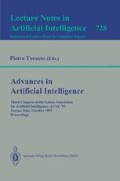Abstract
The goal of our work is to produce a process model account of education in microworlds based on Soar, a theory of cognition and learning. In the context of a microworld that supports the exploration of qualitative electrostatics, we present operational models of both skilled and student interaction. In addition, we describe an episodic memory mechanism encoded in the student model that gives insight into the processes involved in learning from incorrect behavior.
This research was sponsored by the Markle Foundation. The views and conclusions contained in this document are those of the authors and should not be interpreted as representing official policies, either expressed or implied, of the Markle Foundation.
Preview
Unable to display preview. Download preview PDF.
References
Anderson, J. R., Rules of the Mind, 1993, Lawrence Erlbaum Associates, Hillsdale, New Jersey.
Chabay, R. and Sherwood, B., The Electricity Project and the cT Programming Language, 1989, Center for Design of Educational Computing, Carnegie Mellon University, Technical Report No. 89-10.
Clements, D. H., Effects of Logo and CAI environments on cognition and creativity, 1986, Journal of Educational Psychology, 78, 309–318
Clements, D. H., Metacomponential development in a Logo programming environment, 1990, Journal of Educational Psychology, 82, 141–149.
Klahr, D. and Carver, S. M., Cognitive objectives in a Logo debugging curriculum: instruction, learning, and transfer, 1988, Cognitive Psychology, 20, 362–404.
Laird, J. E., Newell, A., and Rosenbloom, P. S., Soar: An architecture for general intelligence, 1987, Artificial Intelligence, 33, 1–64.
Lawler, R., Designing computer based microworlds, 1987, New Horizons in Educational Technology, Yazdani, M., (eds), Ablex Publishing, Norwood, NJ.
Newell, A., Unified Theories of Cognition, 1990 Harvard University Press, Cambridge, Massachusetts.
Polson, P. G. and Kieras, D. E., A quantitative model of the learning and performance of text editing knowledge, 1985, in CHI '85 Proceedings.
Schank, R., C., and Farrel, R. Creativity in education: a standard for computer-based teaching, 1988, Machine-Mediated Learning, 2, 175–194.
Schaube, L., Glaser, R., Raghavan, K., and Reiner, M., Causal models and experimentation strategies in scientific reasoning, 1991, The Journal of the Learning Sciences, 2, 201–138
Sherwood, B. and Chabay, R., Electrical Interactions and the Atomic Structure of Matter: Adding Qualitative Reasoning to a Calculus-Based Electricity and Magnetism Course, 1991, Proceedings of the NATO Advanced Research Workshop on Learning Electricity or Electronics with Advanced Educational Technology, Springer-Verlag, Berlin, Germany.
Simon, T., Claims for Logo; what should we believe and why?, 1987, Computers, Cognition, and Development. Rutkowska, J. C. and Crook, C. (eds), Wiley and Sons.
VanLehn, K., Mind Bugs: The Origins of Procedural Misconceptions, MIT Press, Cambridge, Massachusetts.
Ward, B., ET-Soar: Toward an ITS for Theory-based Representations, Ph.D. dissertation, 1991, School of Computer Science, Carnegie Mellon University.
Author information
Authors and Affiliations
Editor information
Rights and permissions
Copyright information
© 1993 Springer-Verlag Berlin Heidelberg
About this paper
Cite this paper
Conati, C., Lehman, J.F. (1993). EFH-Soar: Modeling education in highly interactive microworlds. In: Torasso, P. (eds) Advances in Artificial Intelligence. AI*IA 1993. Lecture Notes in Computer Science, vol 728. Springer, Berlin, Heidelberg. https://doi.org/10.1007/3-540-57292-9_41
Download citation
DOI: https://doi.org/10.1007/3-540-57292-9_41
Published:
Publisher Name: Springer, Berlin, Heidelberg
Print ISBN: 978-3-540-57292-3
Online ISBN: 978-3-540-48038-9
eBook Packages: Springer Book Archive

